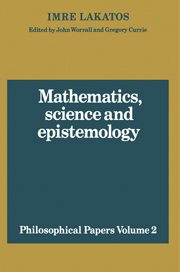Book contents
- Frontmatter
- Contents
- Editors' introduction
- PART 1 PHILOSOPHY OF MATHEMATICS
- 1 Infinite regress and foundations of mathematics
- 2 A renaissance of empiricism in the recent philosophy of mathematics?
- 3 Cauchy and the continuum: the significance of non-standard analysis for the history and philosophy of mathematics (edited by J. P. Cleave)
- 4 What does a mathematical proof prove?
- 5 The method of analysis-synthesis
- PART 2 CRITICAL PAPERS
- PART 3 SCIENCE AND EDUCATION
- References
- Lakatos bibliography
- Indexes
2 - A renaissance of empiricism in the recent philosophy of mathematics?
Published online by Cambridge University Press: 09 January 2010
- Frontmatter
- Contents
- Editors' introduction
- PART 1 PHILOSOPHY OF MATHEMATICS
- 1 Infinite regress and foundations of mathematics
- 2 A renaissance of empiricism in the recent philosophy of mathematics?
- 3 Cauchy and the continuum: the significance of non-standard analysis for the history and philosophy of mathematics (edited by J. P. Cleave)
- 4 What does a mathematical proof prove?
- 5 The method of analysis-synthesis
- PART 2 CRITICAL PAPERS
- PART 3 SCIENCE AND EDUCATION
- References
- Lakatos bibliography
- Indexes
Summary
INTRODUCTION
[According to logical empiricist orthodoxy, while science is a posteriori, contentful and (at least in principle) fallible, mathematics is a priori, tautologous and infallible.] It may therefore come as a surprise for the historian of ideas to find statements by some of the best contemporary experts in foundational studies that seem to herald a renaissance of Mill's radical assimilation of mathematics to science. In the next section I present a rather long list of such statements. I then go on (in section 2) to explain the motivation and rationale of these statements. I then argue (in section 3) for what I call the ‘quasi-empirical’ nature of mathematics, as a whole. This presents a problem – namely what kind of statements may play the role of potential falsifiers in mathematics. I investigate this problem in section 4. Finally, in section 5, I examine briefly periods of stagnation in the growth of ‘quasiempirical’ theories.
EMPIRICISM AND INDUCTION: THE NEW VOGUE IN MATHEMATICAL PHILOSOPHY?
Russell was probably the first modern logician to claim that the evidence for mathematics and logic may be ‘inductive’. He, who in 1901 had claimed that the ‘edifice of mathematical truths stands unshakable and inexpugnable to all the weapons of doubting cynicism’, in 1924 thought that logic (and mathematics) is exactly like Maxwell's equations of electro-dynamics: both ‘are believed because of the observed truth of certain of their logical consequences’.
Fraenkel claimed in 1927 that ‘the intuitive or logical self-evidence of the principles chosen as axioms [of set theory] naturally plays a certain but not decisive role; some axioms receive their full weight rather from the self-evidence of the consequences which could not be derived without without them’.
- Type
- Chapter
- Information
- Mathematics, Science and Epistemology , pp. 24 - 42Publisher: Cambridge University PressPrint publication year: 1978
- 6
- Cited by



